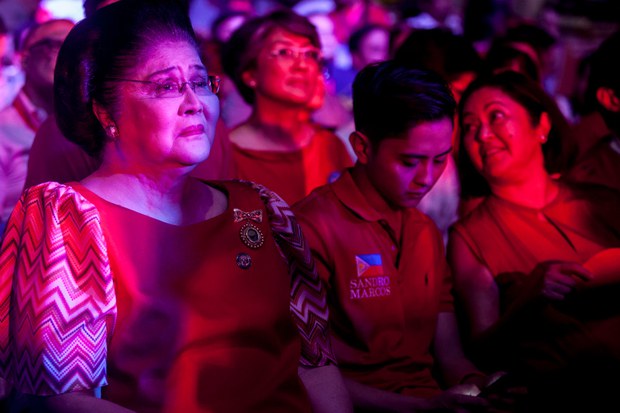Philippine Court Convicts Ex-First Lady Imelda Marcos for Graft, Orders Arrest
2018.11.09
Manila and Cotabato, Philippines
 Former Philippine first lady Imedla Marcos (left) sits among the audience while watching her, son Ferdinand Marcos Jr., during his last campaign night in Mandaluyong City, Philippine, May 05, 2016.
Former Philippine first lady Imedla Marcos (left) sits among the audience while watching her, son Ferdinand Marcos Jr., during his last campaign night in Mandaluyong City, Philippine, May 05, 2016.
A court in the Philippines convicted Imelda Marcos of seven counts of graft Friday after 26 years of hearings, but the former first lady known worldwide for her collection of thousands of shoes said she would appeal the case.
The anti-graft Sandigabayan court sentenced Marcos, 89, to between six and 11 years in prison for each of the seven counts of graft in connection with the transfer of about U.S. $200 million in stolen funds to Swiss foundations when she was governor of Manila.
Associate Justice Rafael Lagos of the Sandiganbayan’s Fifth Division said Marcos had failed to attend the proceedings and gave her a month to explain her absence.
He said, however, that the cases were bailable and she could still post bail for temporary liberty. The case took 26 years to finish, with the prosecution encountering difficulty earlier to produce competent witnesses – many of whom have already died or were too old to be hauled to testify in court.
Assistant Special Prosecutor Ryan Quilala said Marcos, currently a member of Congress who plans to contest the governorship of the family’s northern hometown in polls next year, could be barred from holding any public office once the ruling is rendered with finality.
“She can go to the Supreme Court if her camp thinks there’s grave abuse of discretion in the court’s decision that’s why it’s not yet final and executory,” Quilala said.
He said Marcos and her late husband, dictator Ferdinand Marcos, took part in managing the stolen funds using aliases, but that in all documents “she signed as Imelda Marcos."
In an authenticated copy of a Swiss bank verification form, seen by BenarNews, Marcos wrote William Saunders as an alias and underneath that he signed with his real name. Imelda Marcos filled up the same document using “Jane Ryan” as her pseudonym. The initial deposit: $400 million.
Members of the Marcos family could not be reached for comment and her lawyers representing her did not attend Friday’s court hearing, although Imelda issued a statement late Friday afternoon saying that she planned to appeal the case in court.
She said her lawyer on record was indisposed and had been replaced by a temporary lawyer, who advised the family “that he intends to file a motion for reconsideration.”
The news was welcomed by rally at the state-run University of the Philippines, where activists held a bonfire early evening Friday to remember those who perished during the brutal Marcos regime. The students carried a banner that read "No erasure, no revisions. Never again to martial law," as they chanted anti-Marcos slogans.
People power
Imelda Marcos and her children were allowed to return to the Philippines after Ferdinand Marcos died in exile in 1989, three years after he was toppled by a “people power” revolution.
Thousands went missing or were killed during his two-decade regime, and the family was believed to have raided state coffers of up to $10 billion.
The discovery of some 3,000 pairs of shoes left behind at the basement of Imelda’s bedroom provided a jarring reminder of the opulence and extravagance of the Marcos family, while millions of Filipinos went hungry under the bankrupt government.
Imelda led the family in regaining lost political clout. She is the outgoing congresswoman in the family hometown of Ilocos Norte in the north.
Her daughter Imee Marcos, the outgoing governor of Ilocos Norte, is running to replace her mother in next year’s polls, while brother, Ferdinand Jr., is contesting the vice presidency he narrowly lost two years ago.
President Rodrigo Duterte, who is a fan of the late dictator, is a political backer, and has openly thanked the Marcoses for contributing to his campaign chest two years ago. In his first year in office, Duterte also transferred the late dictator’s remains to Manila’s heroes’ cemetery, igniting widespread protests.
His spokesman, Salvador Panelo, on Friday welcomed the court’s decision, saying it proved that the country’s justice system worked.
“This latest development underscores that our country currently has a working and impartial justice system that favors no one,” Panelo said in a statement.
“We treat this decision by the anti-graft court as a good reminder to all public servants that public office is a public trust and that we are all accountable to the people we serve,” he said.
'Triumph for all Filipinos'
Jacqueline de Guia, a spokeswoman for the Commission on Human Rights, welcomed the court’s verdict, calling it a “triumph for the Filipino people.”
“The Commission stresses the need for truth, so that we all ultimately hold the dictatorship and their cohorts accountable for their crimes,” she said. “We will continue to be vigilant in this process in the interest of upholding justice for the victims of such transgressions. We will never forget.”
The ruling would likely serve as a “crucial electoral guide” for Filipinos, who are bombarded with “historical revisionism” by the Marcos and Duterte camps, said opposition senator Risa Hontiveros.
“The Marcoses may be able to temporarily evade accountability, they may be able, for the moment, to cheat history and whitewash their crimes with the use of "alternative facts" and fake news, they may climb their way back to power and even hide behind the back of President Duterte,” Hontiveros said, “but justice will eventually push its way through their walls of impunity.”
Luis Liwanag from Manila contributed to this report.







